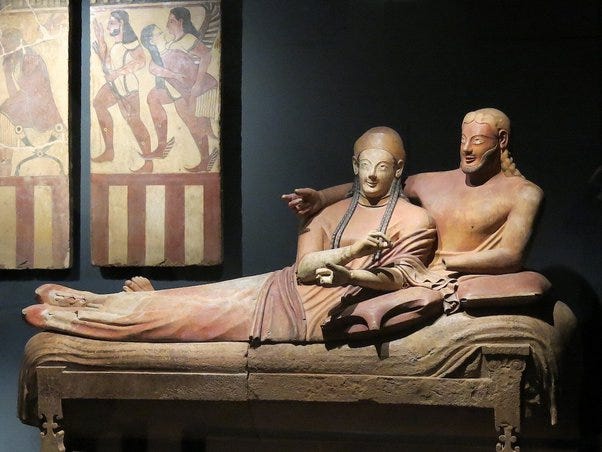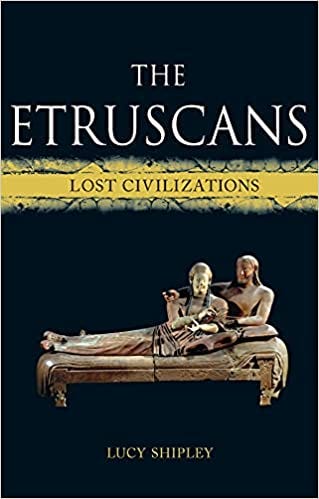Featured Episode - The Etruscans: Their Origins, Influence and Disappearance from History
Issue 24
In This Episode
Who are the mysterious Etruscans? Where did they come from and where did they go? Join host, Petros Koutoupis, as he dives into this intriguing topic and attempts to shed some light on this enigmatic ancient culture that once dominated central Italy and the Tyrrhenian Sea over 2500 years ago.
You can listen to this episode on:
Glossary
Aeneas - A Trojan hero and the son of the Trojan prince Anchises and the Greek goddess Aphrodite (the Roman Venus).
Aeneid - A Latin epic poem written by Virgil in the second half of the first century BCE. It tells the tale of the legendary Aeneas fleeing Troy and traveling to Italy.
Anatolia - The region that is Turkey today.
BCE - Before the Common Era, the equivalent of B.C.
Bronze Age - Defines a historic period dated to approximately between 3300 BCE and 1200 BC. It is characterized by the use of bronze, the presence of writing in some areas, and other early features of urban civilization.
Carthage - Originally a Phoenician colony, Carthage began as an important trading hub located in the Western Mediterranean and eventually rose as a great power, extending their empire into Europe (between the 7th and 3rd centuries BCE).
CE - The Common Era, the equivalent of A.D.
Etruria - A region once located in central Italy and what is Tuscany today.
Etruscans - An ancient civilization inhabiting ancient Etruria as early as 900 BCE. They were highly cultured and spoke a unique Etruscan language still largely undeciphered today. The Etruscans were competing with the Greeks and later Carthaginians for control over the Tyrrhenian region and until they were eventually absorbed into the Roman empire.
Herodotus - (c. 484 – c. 425 BCE) An ancient Greek historian and geographer.
Lemnos - An island located in the Northern Aegean Sea.
Lydia - An Iron Age kingdom of western Anatolia (1200–546 BCE).
Magna Graecia - Translating to “Greater Greece”, Magna Graecia was the name given to the southern Greek colonies on the Italian boot.
Plutarch - (46 - 119 CE) A Greek philosopher, historian, biographer and priest at the Temple of Apollo in Delphi.
Po Valley - A major geographic region located in Northern Italy and running from the Western Alps to the Adriatic Sea.
River Tiber - The river flowing in central Italy and just North of Rome.
Thucydides - (c. 460 – c. 400 BCE) An Athenian historian and general.
Tyrrhenian Sea - Part of the Mediterranean Sea and off the western coast of Italy.
Thalassocracy - A maritime empire.
Recommended Books
The Etruscans: Lost Civilizations
The Etruscans were a powerful people, marked by an influential civilization in ancient Italy. But despite their prominence, the Etruscans are often portrayed as mysterious—a strange and unknowable people whose language and culture have largely vanished. Lucy Shipley’s The Etruscans presents a different picture.
Shipley writes of a people who traded with Greece and shaped the development of Rome, who inspired Renaissance artists and Romantic firebrands, and whose influence is still felt strongly in the modern world. Covering colonialism and conquest, misogyny and mystique, she weaves Etruscan history with new archaeological evidence to give us a revived picture of the Etruscan people. The book traces trade routes and trains of thought, describing the journey of Etruscan objects from creation to use, loss, rediscovery, and reinvention. From the wrappings of an Egyptian mummy displayed in a fashionable salon to the extra-curricular activities of Bonaparte, from a mass looting craze to a bombed museum in a town marked by massacre, the book is an extraordinary voyage through Etruscan archaeology, which ultimately leads to surprising and intriguing places.
The Etruscans: A Very Short Introduction (Very Short Introductions)
From around 900 to 400 BC, the Etruscans were the most innovative, powerful, wealthy, and creative people in Italy. Their archaeological record is both substantial and fascinating, including tomb paintings, sculpture, jewelry, and art. In this Very Short Introduction, Christopher Smith explores Etruscan history, culture, language, and customs. Examining the controversial debates about their origins, he explores how they once lived, placing them within the geographical, economic, and political context of the time. Smith concludes by demonstrating how the Etruscans have been studied and perceived throughout the ages, and the impact this has had on our understanding of their place in history.






